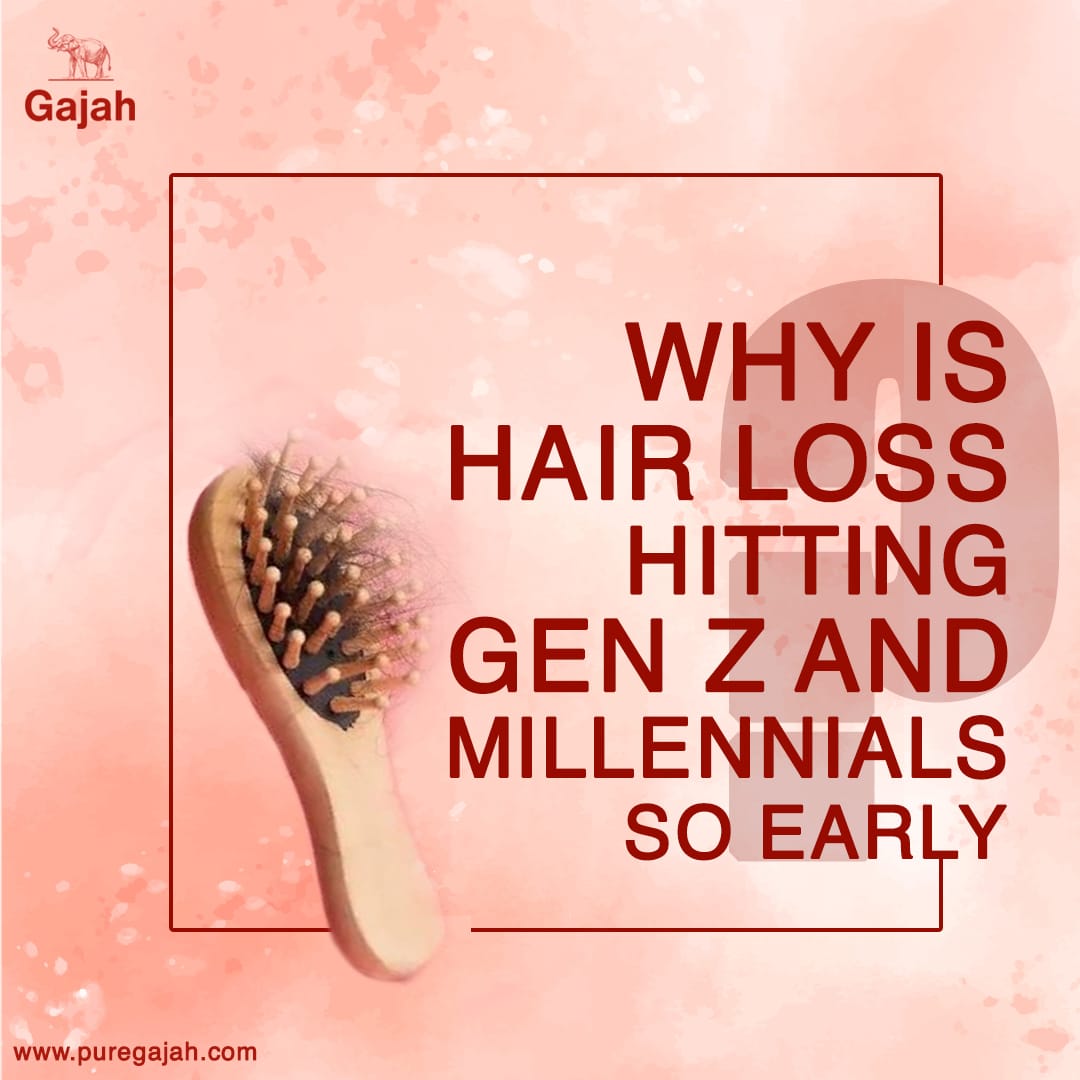
Why Gen Z and Millennials Are Losing Hair Faster and Earlier than Previous Generations?
Share
Hair loss is typically associated with aging, but it seems that younger people—particularly those in their 20s and 30s—are now experiencing hair thinning and balding much sooner than previous generations. New studies and anecdotal evidence suggest that this trend is on the rise, and there are several factors contributing to early hair loss in Generation Z and Millennials.
Hair Loss in Young People: A Growing Concern
Recent research conducted at Tsinghua University in Beijing, China, shed light on this issue. A self-reported survey of 4,000 students revealed that 60 percent of the participants noticed significant hair loss. Surprisingly, many of these students were unaware of the problem until it was pointed out by friends or family members. Around 40 percent of respondents, however, were acutely aware of their receding hairlines.
While hair loss is a common concern across many fields of study, the survey found that students in subjects like science, math, and automotive engineering were the least likely to report hair loss, suggesting that lifestyle factors and possibly stress levels could play a role.
Why Are Young Men Losing Their Hair?
One of the factors why young men are losing their hair at a faster rate is modern lifestyle practices. It is not only genetic factors now, external stress factors and daily regimes are also making hairs fall off early.
Key contributors to early hair loss include:
● Chronic stress from work, studies, or digital exposure
● Malnutrition as a result of consumption of processed foods
● Sleep disturbances and insomnia at night
● Overuse of heat styling tools on the hair rough shampoos
● Sedentary lifestyle with little physical activity
A pure, herb-based hair tonic like Gajah Hair Tonic tends to nourish the root and scalp and strengthen the roots.
Millennials and Hair Loss: A Widespread Issue
This trend isn't limited to China. In the United States, an increasing number of Millennials are also grappling with early hair loss. Dermatologists like Dr. Andrea Hui in San Francisco have observed a surge in patients as young as 18 seeking help for thinning hair and receding hairlines. Even hairstylists like Angelo David in New York are seeing younger clients concerned with hair loss—an issue that was once predominantly associated with older individuals.
So, what’s causing this surge in hair loss among young people? The answer appears to be multifaceted, with factors ranging from stress to diet playing a significant role.
The connection between millennials and hair loss is becoming clearer. Unlike previous generations, millennials experience a lot of stress, screen addiction, and pollution which impacts the condition of the hair.
Reasons why millennials experience hair loss:
● Skipping breakfast or relying on fast food
● Staying indoors with minimal vitamin D exposure
● High mental load from work or social media
● Neglecting scalp care routines
● Frequent coloring, bleaching, or straightening
A reliable, chemical-free routine that includes hair tonic and hair re-growth oil can help in coping with the early thinning of hair.
Why Are Men Going Bald So Young?
Why are men going bald so young? This is now becoming a major issue. Early balding is widely associated with mental pressure, negligence in self-care, and poor scalp health due to a hectic lifestyle.
Common causes of early balding include:
● Hormonal changes triggered by stress
● Protein-poor diets
● Excessive use of styling products having chemical ingredients
● Infrequent oiling or scalp massage
● High exposure to air pollution and hard water
Switch over to our nutritious gentle comprehensive plant-based hair growth tonic, that promotes healthy follicles and scalp balance.
Why Are So Many Men Bald in Their 20s and 30s?
It is not a new thing to find men in their 20s with visible hair loss or bald spots. But why are so many men bald at a young age today? Unhealthy lifestyle is causing hair loss to be an everyday problem.
Contributing lifestyle factors include:
● Lack of sleep and irregular daily routine
● Blue light exposure from screens
● Increased anxiety and emotional fatigue
● Crash diets and excessive caffeine
● Product build-up from gels and sprays
Revitalize your scalp by treating it with a nourishing hair regrowth oil like Gajah Regrowth Hair Oil made to cope with busy modern lifestyles.
The Role of Stress in Hair Loss
Stress is one of the most significant contributors to hair loss, especially in younger people. The American Psychological Association (APA) has reported that Millennials and Generation Z experience higher levels of stress than older generations. The demands of modern life, financial pressures, and even social media can exacerbate this stress, leading to adverse physical effects, including hair loss.
Stress affects the hair growth cycle by pushing hair follicles prematurely out of the growth phase (anagen) into the resting phase (telogen), causing more hair to fall out than usual. This type of hair loss, known as telogen effluvium, can occur suddenly and is often triggered by stressful events or prolonged stress.
Research has even demonstrated this link in animals. In studies involving mice, exposure to loud noises—a source of stress—caused hair follicles to enter the catagen phase prematurely, resulting in hair loss. Similarly, monkeys with higher cortisol (a stress hormone) levels were more likely to experience hair thinning.
Diet and Nutritional Deficiencies
While stress is a key factor, diet also plays a crucial role in hair health. The growing popularity of vegetarian and vegan diets among Millennials and Gen Z may contribute to this trend of early hair loss. Research conducted by Dr. Emily L. Guo at the Baylor College of Medicine found that severely reduced protein intake, as well as deficiencies in essential nutrients like zinc and vitamin D, can negatively impact hair growth.
A balanced diet rich in proteins, vitamins, and minerals is essential for maintaining healthy hair. Hair follicles require sufficient nourishment to support growth, and when the body lacks these nutrients, hair health suffers.
Hair Care Habits and Treatments
Hair care practices, including excessive styling, bleaching, and the use of hair extensions, can also contribute to early hair loss. Dr. Doris Day, a dermatologist, explains that frequent bleaching, dyeing, and the weight and tension from hair extensions can weaken hair follicles, leading to breakage and hair fall. These practices are becoming increasingly common among younger people, contributing to the rising trend of early hair thinning.
Moreover, millennials and Gen Z tend to be more "hair aware" than previous generations, thanks in part to media exposure and the influence of celebrities. The pressure to maintain thick, attractive hair has led to more frequent salon visits and the use of hair treatments that, if overused, can cause damage.
Is There a Way to Prevent Hair Loss?
For those concerned about early hair loss, it’s essential to consult with a dermatologist who can diagnose the underlying cause and recommend appropriate treatments. Whether it’s managing stress, adjusting dietary habits, or exploring medical or nutritional interventions, there are ways to mitigate hair loss and promote regrowth.
The Bottom Line: Why Younger Generations Are Losing Their Hair
The rise in early hair loss among Gen Z and Millennials is due to a combination of factors, including higher levels of stress, poor diet, and damaging hair care practices. While some hair loss may be inevitable due to genetics, taking proactive steps to manage stress, improve nutrition, and care for your hair can make a significant difference.
Natural products, like Gajah Hair Tonic and Gajah Luxury Hair Oil, are formulated with herbs and oils that nourish the scalp, strengthen hair follicles, and combat hair loss without harmful chemicals. Ingredients like hibiscus, amla, and bhringraj found in Gajah products support hair regrowth and provide the essential nutrients that stressed hair needs.
Whether you’re experiencing hair loss yourself or want to prevent it in the future, focusing on overall wellness—both physically and mentally—can help maintain healthy hair and slow the progression of hair thinning.

Dr. Vani Nair, Senior Ayurvedic Doctor
Learn MoreDr. Vani Nair was born in Kottayam, Kerala into the Puthenpurackal Tharavadu, in which the traditional practice of Ayurveda can be traced as far back as 110 years. She obtained her BAMS degree from Sri Sri College of Ayurvedic Science and Research in 2009, and has over 15 years of experience in treating patients facing hair fall and scalp related issues.




